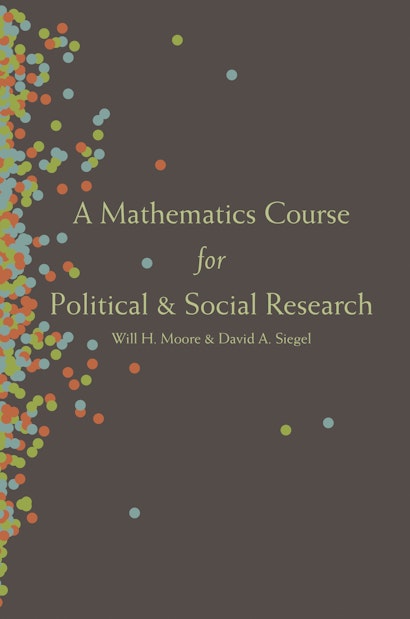Political science and sociology increasingly rely on mathematical modeling and sophisticated data analysis, and many graduate programs in these fields now require students to take a “math camp” or a semester-long or yearlong course to acquire the necessary skills. Available textbooks are written for mathematics or economics majors, and fail to convey to students of political science and sociology the reasons for learning often-abstract mathematical concepts. A Mathematics Course for Political and Social Research fills this gap, providing both a primer for math novices in the social sciences and a handy reference for seasoned researchers.
The book begins with the fundamental building blocks of mathematics and basic algebra, then goes on to cover essential subjects such as calculus in one and more than one variable, including optimization, constrained optimization, and implicit functions; linear algebra, including Markov chains and eigenvectors; and probability. It describes the intermediate steps most other textbooks leave out, features numerous exercises throughout, and grounds all concepts by illustrating their use and importance in political science and sociology.
- Uniquely designed and ideal for students and researchers in political science and sociology
- Uses practical examples from political science and sociology
- Features “Why Do I Care?” sections that explain why concepts are useful
- Includes numerous exercises
- Complete online solutions manual (available only to professors, email david.siegel at duke.edu, subject line “Solution Set”)
- Selected solutions available online to students
Will H. Moore is professor of political science at Florida State University. David A. Siegel is associate professor of political science at Duke University. He is the coauthor of A Behavioral Theory of Elections (Princeton).
"This book by Moore and Siegel, intended for the advanced political and social science student, appropriately avoids mathematical proofs and unnecessarily formal definitions while maintaining rigor and proper terminology. . . . When needed, the clear illustrations accompany the material, providing strong visualization of the related concept."—Choice
"Written in an intuitive and accessible way, this book can be used as a primer for math novices in the social sciences as well as a handy reference for the researchers in this area."—Nicolae Popovici, Studia Mathematica
"Moore and Siegel provide an exceptionally clear exposition for political scientists with little formal training in mathematics. They do this by emphasizing intuition and providing reasons for why the topic is important. Anyone who has taught a first-year graduate course in political methodology has heard students ask why they need to know mathematics. It is refreshing to have the answers in this book."—Jan Box-Steffensmeier, Ohio State University
"This highly accessible book provides a comprehensive introduction to the essential mathematical concepts political science students need to succeed in graduate school and their research careers. It assumes students have no mathematical background beyond high school algebra, and uses examples from political science. Moore and Siegel explain concepts in plain English and do an excellent job balancing the technical details with the intuition needed to understand them."—Kyle A. Joyce, University of California, Davis
"The major hurdle in teaching math to political science graduate students isn't the math. It's convincing them to concentrate on difficult topics that seem abstruse and useless. This book persistently reminds students why quantitative methods are the coin of the political science realm. I can see it becoming a staple of graduate courses for years."—William Minozzi, Ohio State University
Professors: A Solutions Manual is available from the author at:
david.siegel@duke.edu. In your e-mail request, please put “Solution Set” in the subject line.

